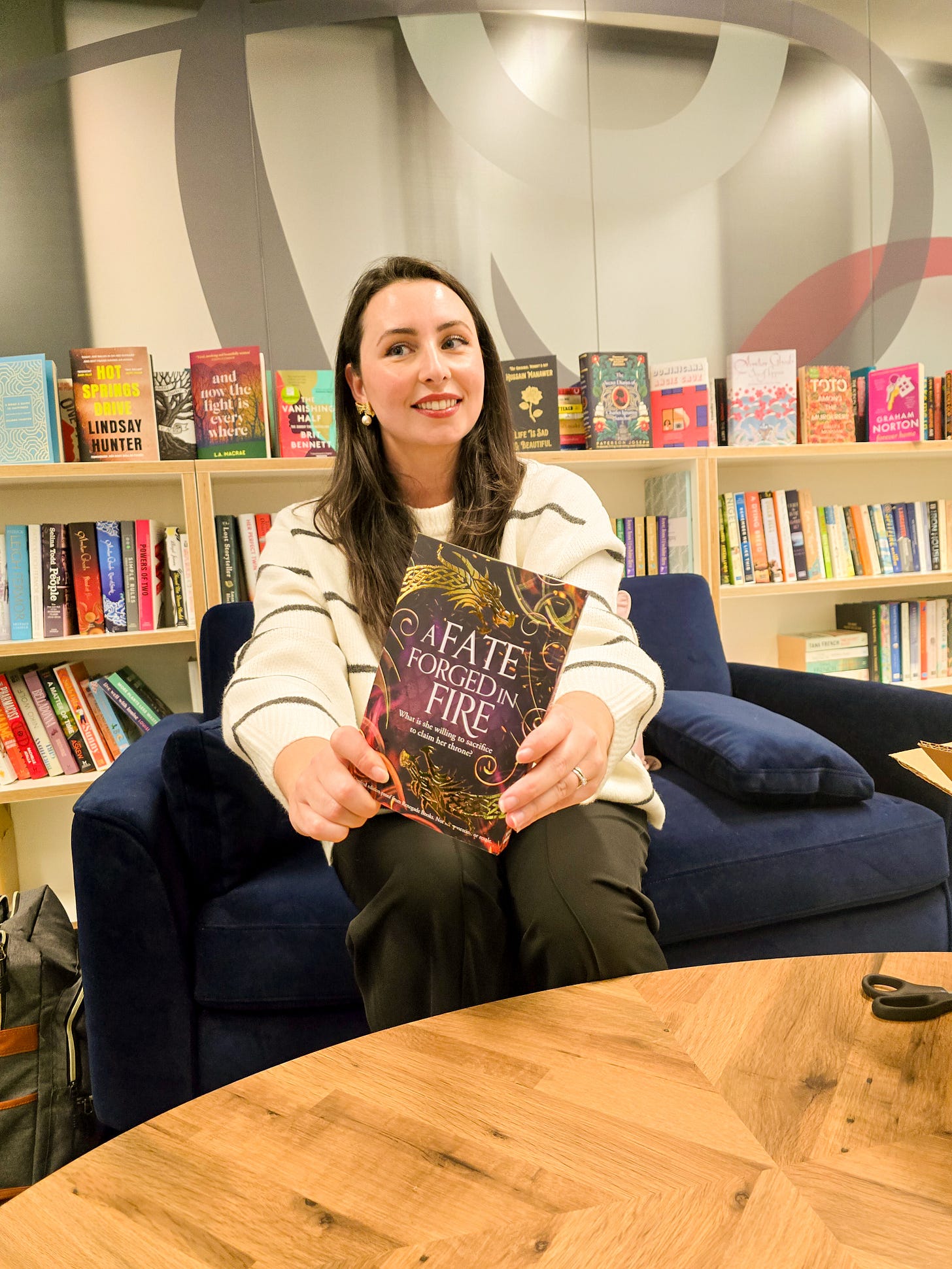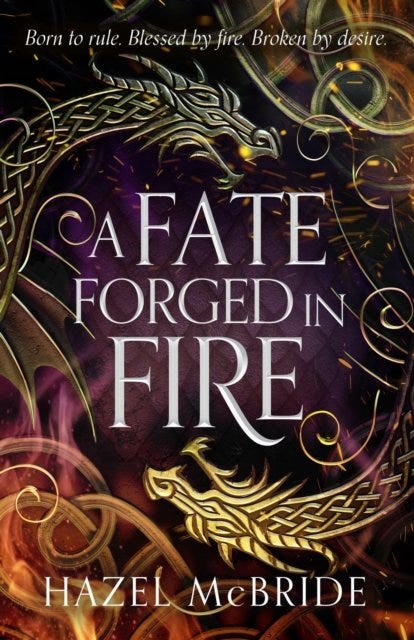No one can write the way you do, no one can tell stories the way you do.
Hazel McBride's (neurodivergent) notes on writing
When I found out about Hazel McBride’s work I was buzzing to hear about another Scottish autistic bi 2025 debut! So I am absolutely delighted she agreed to chat to me for this newsletter. It’s really interesting to hear about Hazel’s fantasy world being her special interest and how she needs a large amount of free time to write. Hazel’s journey to publication is also very interesting and inspiring, and really showcases the different routes into getting an agent and traditional publishing!
It’s lovely to see another recommendation for Elle McNicoll's fantastic work too! Lastly, thanks so much to all of you for reading along as I get to talk to so many fantastic writers - I’ve got some amazing interviews lined up and I can’t wait to share. The interviews will always be free, so if you do have the ability/desire to be a paid subscriber it massively supports my work on the newsletter <3.
Any requests for questions/interviewees let me know in the comments!
Hey Hazel! Tell us a bit about you and your work.
Hello! I’m Hazel, a Scottish author living in the Netherlands with my Dutch husband. I moved here in 2020 in the middle of the pandemic after my husband and I were in a long distance relationship for 4 years. Even though I don’t live in Scotland anymore, I still love my country and use a lot of Scottish and Celtic folklore in my books.
A Fate Forged in Fire is my upcoming fantasy romance book (the first in a duology) and it was inspired by my love of Scottish culture and my obsession with House of the Dragon. The idea for this story actually began as Aemond Targaryen fanfiction!
A Fate Forged in Fire is about a powerfully blessed blacksmith who must use her wits and fire magic to overthrow the corrupt powers ruling the kingdom, while also fighting her desire for a certain dragon-riding adversary. Once a territory built on matriarchal rule, Tìr Teine has been without a female heir for centuries. Through a long line of corrupt kings, an oppressive anti-magic teaching has infected the land - leading to the tragic decline of the dragons.
Does being neurodivergent impact your creative process? And if so how?
Massively. Hyperfixation and my special interests keep me focused (sometimes to the detriment of everything else).
When House of the Dragon became my latest special interest in 2022 after season one aired, I immediately began consuming everything I could relating to that world. When that wasn’t enough, I began writing my own fanfictions. In 12 days I wrote over 100,000 words in my first fic ‘The One Eyed Prince’. Somehow, it wasn’t complete trash and people actually enjoyed it, but that all-consuming obsession with HOTD is what allowed me to get so many words on a page so quickly.
As any other autistic person knows, that can also have its own pitfalls. When I get consumed by my writing it almost feels like I have this desperate urge to get the story out of my brain and I can’t do anything else until that happens. I end up going without sleep, barely eating, my husband has to remind me to take toilet breaks, and even when I am away from my laptop all I can think about is getting back to writing.
This means that I have to have some level of self-awareness and find a little more balance. I manage my routine in a way that I take a full hour for lunch and my dog makes sure I get out of the house for fresh air. Even still, there are a lot of ways in which my autism impacts my process. For example, I need a large amount of completely free time where I can immerse myself in my world and characters in order to get into the writing ‘flow’ (as well as soundtrack music and noise cancelling headphones). I know a lot of authors who enjoy writing ‘sprints’ where they sit down for fifteen minutes and set a timer, but that doesn’t seem to work for me.
I would definitely say that my world of Erisocia is a new special interest, tagging onto my lifelong interest in books and fantasy worlds, so it makes my job as an author so enjoyable that I get paid to do what I want to do all day.
Is neurodiversity a theme in your work? Or do you write neurodivergent characters?
So much of writing characters is really just writing about how they react to the environment around them. For example, having an FMC who is anxious without it being a by-product of neurodivergence or writing a character who thrives on routine and dislikes disruptions who might share autistic traits with someone like myself.
As a fantasy writer whose characters exist in a medieval world, things like neurodivergence, disabilities and sexuality are as diverse in my world as they are in our shared reality – without ever being ‘labelled’ in modern terms. However I would hope that this comes across in the writing without being explicitly declared.
What's one piece of advice would you give to aspiring neurodivergent writers out there?
Find what works for you.
The way you write and explore your craft doesn’t have to look like anyone else’s and also be patient with yourself. Our brains can become so quickly overloaded that it can take time just to understand ourselves and why we react in certain ways, never mind our characters.
Remember that neurodivergence is what makes us unique and that is such a strength in a creative field. No one can write the way you do, no one can tell stories the way you do.
Also – don’t be afraid to ask for what you need. Your team wants you to be able to achieve a mindset where you are writing books and feeling comfortable to do so and good editors/agents will do what they can to help.
Is there a book (or other kind of art) by a neurodivergent artist that you love and you'd like to draw our attention to?
If you like romance then Helen Hoang is an excellent author of books like The Kiss Quotient, who is autistic and writes autistic characters. Elle McNicoll is also a huge advocate for more representation of neurodiversity in publishing is an autistic and dyspraxic author and her debut A Kind of Spark is fantastic.
What’s one thing the publishing industry could do to make things better and more accessible for neurodivergent writers?
I have only been represented by the traditional publishing industry for a little over a year now and since this is all very new to me, I still struggle to pinpoint what is overwhelming for me and what is ‘normal’ for others.
However, one of the things I have struggled with the most during the editing stage is not being able to have a discussion when I feel like my editors might be misunderstanding something I have written. So often they will just leave a comment in a Google Doc, send it at 5pm on a Friday and then I’ll ruminate on it all weekend, desperate to explain that I meant something different. This is why it’s so important to ask for what we need – my editors are very happy to jump on a zoom call, or clarify via email. I’ve had to learn to be patient and remind myself that I’ll get the clarification I need after the weekend, or try to ask them to send these emails mid-week instead.
Additionally, the publishing industry in general is very chaotic – which can be so difficult to navigate as a neurodivergent person. Oftentimes we are working with thirty different schedules, internationally, so it is normal that some things might go on the back burner, change last minute, or not be finalized until the last moment. Personally, I have asked my editors and PR people to please give regular updates (even if nothing has changed) so I know what’s going on and feel like I can plan.
I feel so lucky that the teams behind me are so understanding, but I have also had to learn to rely on my own coping mechanisms when things do get overwhelming.
And lastly, how can readers of the newsletter support your work?
Simply talking about the book or sharing on social media is hugely impactful! You can find me everywhere @hazelmcbrideauthor and my YouTube channel will be covering all of my book tour as well!
If you are in a position to pre order the book that is what helps me most, but if not you can always request it to be stocked by your local library too. For those who struggle with physical books, it is also available in audiobook format and for e-readers.





